United in Diversity: Fashion Roundtable's Call for Unity Amidst Unrest
Also this week: UK Manufacturing in Crisis and Labour's first month in power
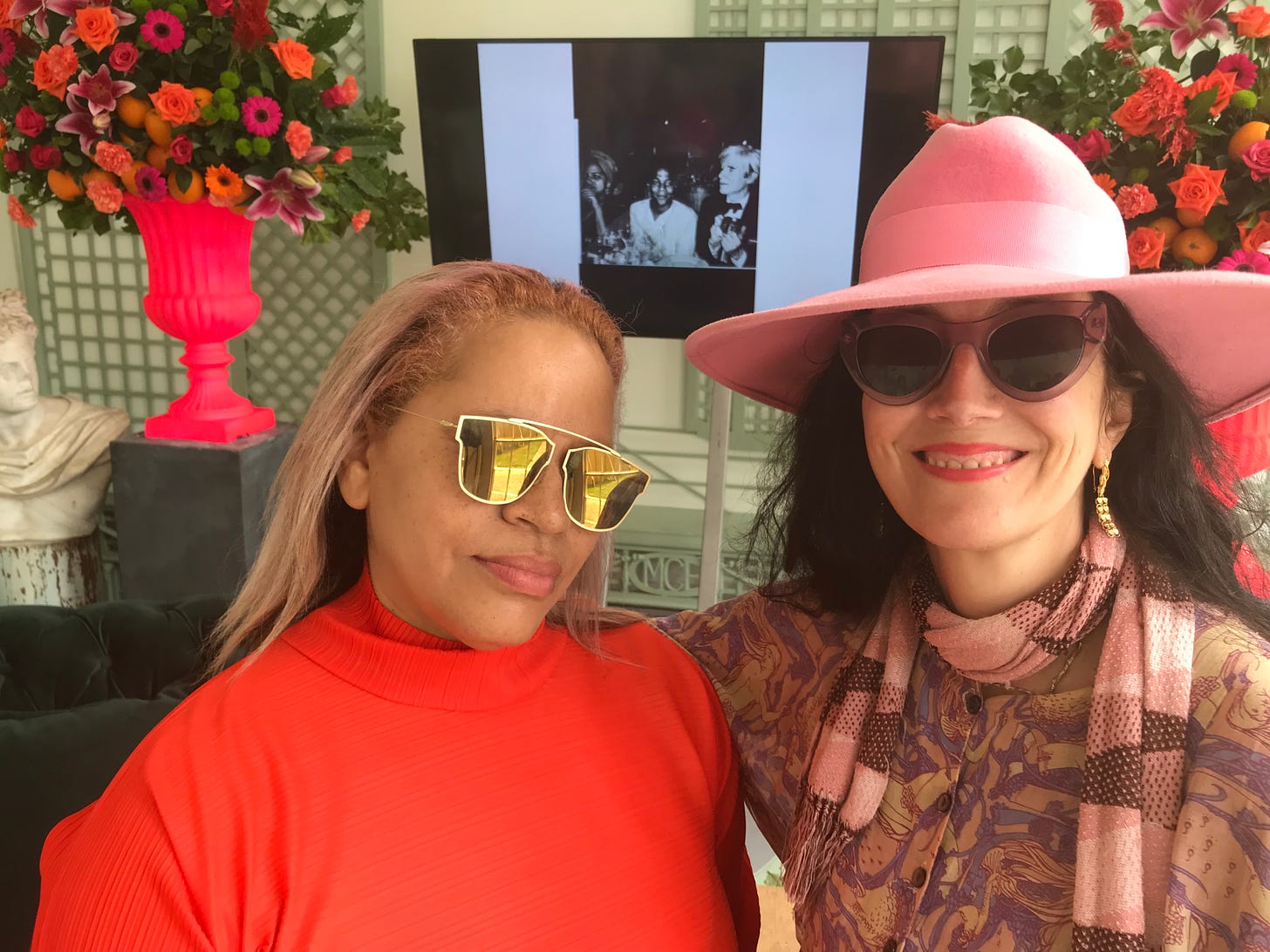
In a world where the only constant seems to be change, unity in diversity remains a powerful force for good. Recent events across the UK, marked by protests and unrest, have highlighted the urgent need for a collective reaffirmation of our shared values. At Fashion Roundtable, we believe that the richness of our cultural tapestry is one of our greatest strengths. We stand firmly behind Prime Minister Keir Starmer in these challenging times, advocating for unity, not division, as the way forward. Our "Made by Immigration" campaign seeks to celebrate the cultural richness that diversity brings to the UK, reinforcing that together, we are stronger.
Celebrating Our Collective Strength
Our campaign is inspired by personal stories that underscore the beauty of diversity. Meeting with friends from varied backgrounds — Asian, African, and European —reminded me of the vibrant cultural mosaic that defines our nation. The positive feedback from sharing this experience publicly reaffirmed what we at Fashion Roundtable have always believed: diversity enriches our lives and strengthens our communities.
The "Made by Immigration" campaign aims to counter the negative narratives around immigration, celebrating the countless contributions of immigrants to our society. Through storytelling, visual campaigns, and community engagement, we aim to highlight the positive impact of multiculturalism in fashion and beyond. Collaborations with organisations, influencers, and public figures who support diversity and inclusivity will amplify our message, reaching a wider audience.
Join the conversation with the hashtag #madebyimmigration and share your stories of how immigration has shaped your life and community.
The Fashion Industry: A Beacon of Diversity
Fashion has always been a mirror of society, reflecting our values, aspirations, and dreams. However, it also has the power to shape them. According to our report on Representation and Inclusion in the Fashion Industry, diverse companies are more innovative and perform better financially. The collective spending power of ethnic minorities in the UK is estimated at £300 billion, with the disability market alone worth £274 billion. Yet, representation remains limited. For example, only 11% of workers in the UK's creative industries are from BAME backgrounds, despite accounting for a much larger portion of the population.
Our industry is missing out on significant opportunities for growth by failing to fully embrace diversity. The spending power of people from ethnic minority backgrounds and those with disabilities presents a substantial market opportunity. Moreover, the fashion industry itself is an economic powerhouse, contributing significantly to the UK economy. With a more inclusive approach, it has the potential to grow even further, creating jobs and fostering innovation.
Real Stories, Real Impact
The personal stories shared in our report highlight the challenges and triumphs of those working within the fashion industry. Many individuals have faced discrimination and underrepresentation, yet their resilience and creativity shine through. By amplifying these voices, we hope to inspire change and encourage the industry to embrace the full spectrum of talent that our diverse society offers.
As Tamara Cincik, our CEO and founder, poignantly reflected, "In a weekend when anyone from a Muslim or black background feels the familiar sense of we are not welcome here & starts mentally packing their bags, it's vital to remember our strength in unity." Tamara's words echo the experiences of many who have faced discrimination, yet remain steadfast in their contributions to British society. Her call to action is clear: "Immigrants made this country great, an island which has always been a host to migrants - from Vikings to Saxons, to Normans. We are here because you were there."
Leadership and Vision
Under the guidance of Tamara Cincik and Karen Binns, Fashion Roundtable has consistently championed diversity and inclusion within the fashion industry. Tamara's vision for an industry that values and represents all voices has been instrumental in shaping our initiatives. As we prepare to launch the "Made by Immigration" campaign, her dedication to using fashion as a force for positive change continues to inspire our work. Karen Binns, with her extensive experience and keen eye for talent, highlights diverse voices in fashion, ensuring that our industry reflects the world we live in.
Rahemur Rahman, one of our ambassadors and a designer known for his inclusive approach, embodies this ethos. His work celebrates the beauty of diversity, challenging traditional norms and showcasing the rich cultural heritage of his South Asian roots. Through collaboration and creativity, he is helping to redefine what it means to be truly inclusive in fashion.
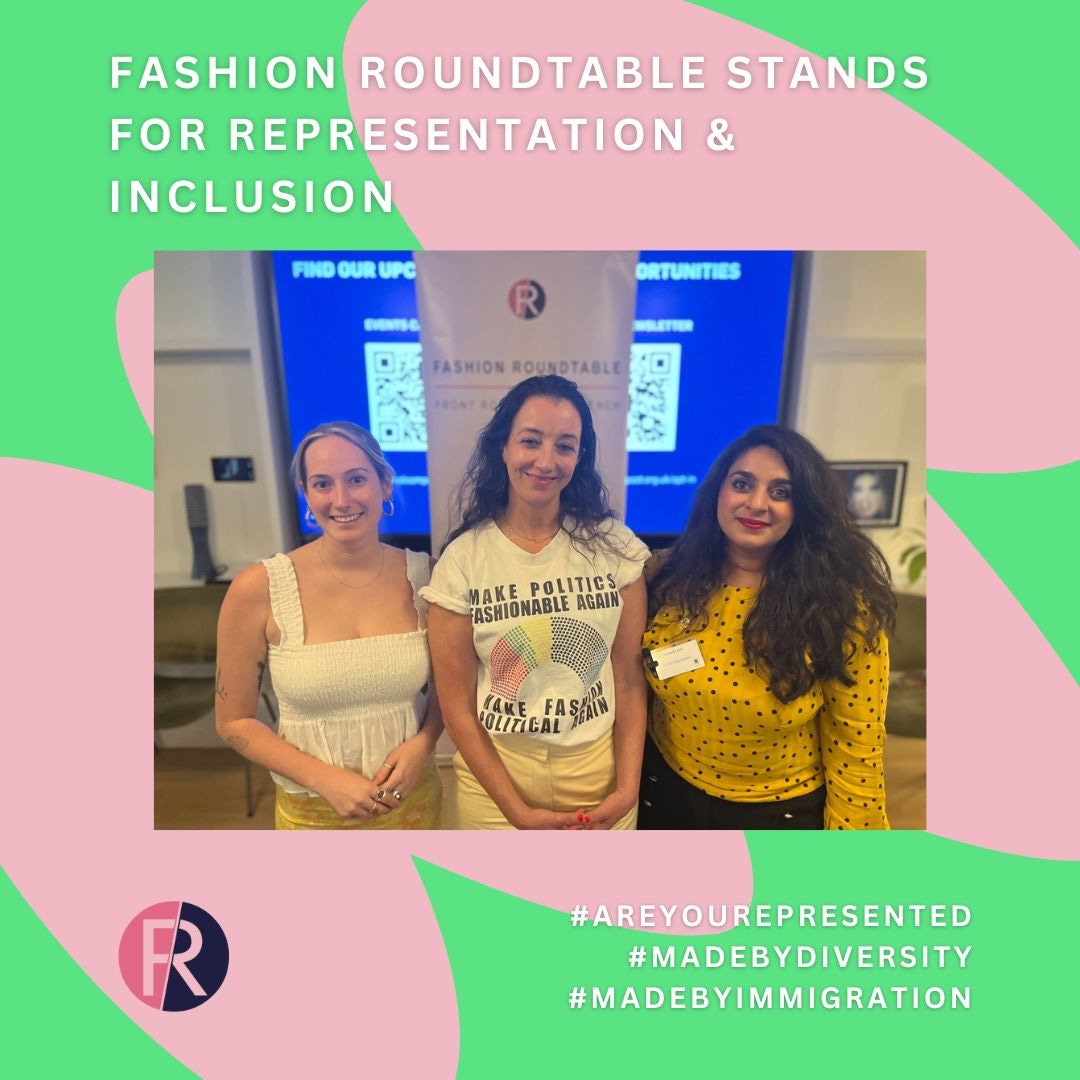
Conclusion: A United Front for a Brighter Future
In these times of turmoil, it is more important than ever to stand together and champion the values that unite us. Fashion Roundtable is committed to leading this charge, using the power of fashion to promote a more inclusive and harmonious society. By embracing diversity and fostering unity, we can overcome the challenges we face and build a future where everyone is valued and represented.
As Tamara so aptly put it, "If we are going to lift this country out of poverty, it’s going to be the immigrants to provide a lot of the taxable income, so my suggestion to the mainstream media is to start talking about what immigrants have done for this country, and do it now." Let us remember that in our diversity lies our strength. Together, we can create a more vibrant, innovative, and prosperous Britain.
Join us in our "Made by Immigration" campaign and help us spread the message that unity, not hate, is the way forward. Use the hashtags #madebyimmigration and #areyourepresented to share your stories and become part of this vital movement. Let us fashion a future that celebrates and embraces our diversity.
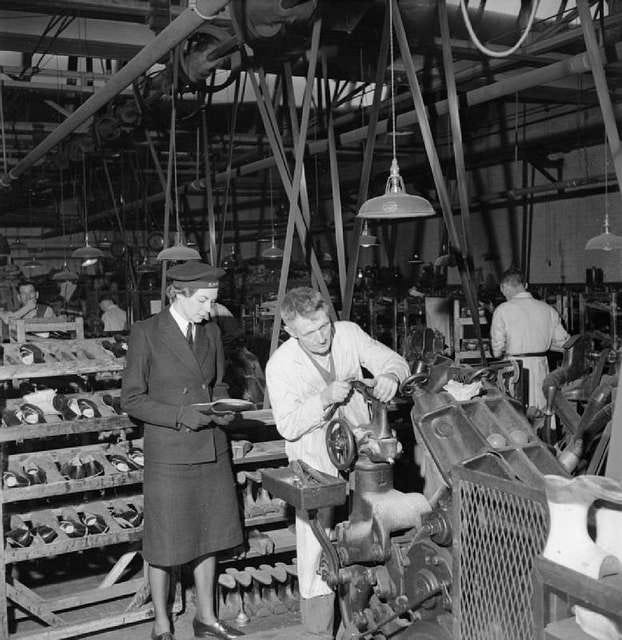
Manufacturing in Crisis: The UK’s Fall and the Road Ahead
Examining the consequences for the fashion and textile industry. By Alix Coombs
UK manufacturing has fallen behind
This week, Make UK released their annual UK Manufacturing report, revealing that the UK has fallen out of the top 10 manufacturing countries for the first time since 2012.
Now in the 12th spot, the UK has fallen 4 places from 2023. In contrast, Mexico has jumped from 12th to 7th place, and Russia from 10th to 8th. The UK also trails behind our European counterparts, including Germany, Italy and France who are all in the top 10.
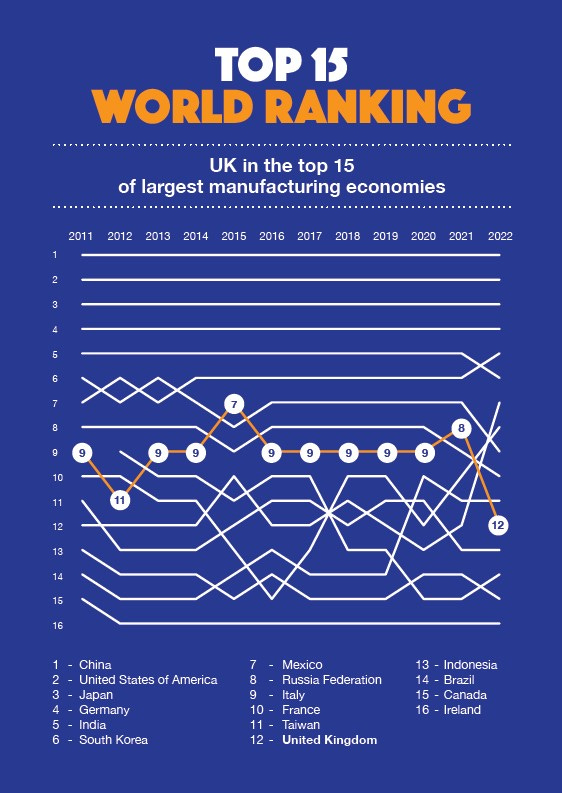
The decline of UK manufacturing since the 1990s, combined with increasing value being placed on the service industry has ultimately resulted in the UK slipping down the ladder. Despite manufacturing accounting for £217 billion of output for the UK and providing 2.6 million UK jobs, with wages an average of 10% higher than the rest of the economy, we have seen a continuing decline in the value placed on manufacturing.
As Kate Hills, Founder of Make it British, put it:
“Manufacturing has been totally neglected by a whole succession of governments. It's been pushed aside in favour of a service industry and it's decimated businesses and communities, and really it should be the backbone of the UK economy.”
What does this mean for fashion?
While the Make UK report fails to capture the impact of this on the fashion and textile sub-sector, small businesses and communities are certainly feeling the impact of the shrinking space.
Earlier this year, textile manufacturing firm Culimeta-Saveguard in the Greater Manchester area went into administration. The firm employed around 200 people and made technical textiles for the motor industry. It was also the parent company of the only cotton spinner left in the UK, English Fine Cottons. When it was established in 2016, English Fine Cottons invested £4.8 million in regenerating a former Victorian cotton mill, installing new technologies to create luxury yarn.
This loss of English Fine Cottons is indicative of not only the state of manufacturing in the UK, but also the state of local garment and textile industries. In a world where overseas sourcing and manufacturing have become necessary due to a lack of options locally, small brands and manufacturers are competing with thriving global brands such as Shein and Zara, in a battle they’re unlikely to ever win.
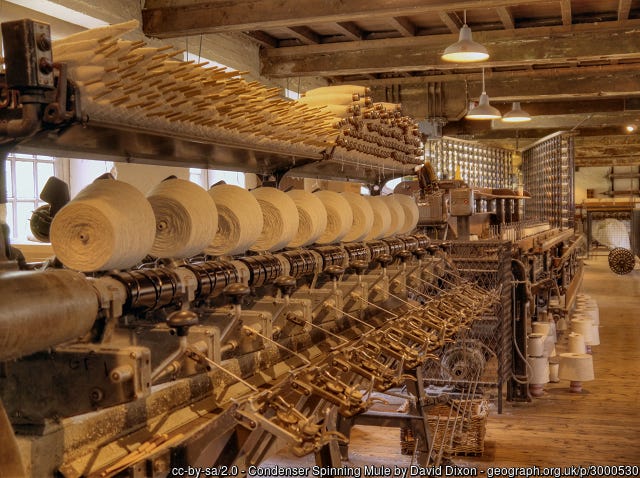
Fashion Roundtable and Kate Hills reached out to Jonathan Reynolds MP in March of this year to discuss what Labour was going to do about the loss of a manufacturer so critical to the supply chain, but the MP was unwilling to meet. He also did not return a request for comment on this article.
Jenny Holloway, fashion industry veteran, CEO of Fashion-Enter, and longtime advocate for local and ethical manufacturing, highlighted how losses like this all over the country have impacted workers in particular:
“When we started working in Leicester there were 1500 garment factories employing the best part of 15,000 skilled workers. Today there are 96 factories left. How on earth could we have let this happen? Leicester is a major manufacturing cluster, it currently has high unemployment, 2% higher than the national average, and retailers are crying out for newness and speed of response fashion.”
Jenny said the same situation can be seen in Manchester and London. Consumer demand for fast fashion has risen exponentially, pushing slower and more ethical brands, who manufacture locally, out of the space. Local brands simply can’t compete with countries like Bangladesh, where manufacturing wages are as low as 99p per hour.
The government’s role in revitalisation
Sadly, UK fashion is suffering and will continue to until Sir Keir Stamer’s newly formed government recognises the need to breathe life back into local industries with a solid industrial strategy that will prevent the future loss of businesses like Culimeta Saveguard, as well as protect and create jobs.
Kate Hills says that the government has a particularly important role to play, not only from a policy perspective but also as a direct supporter and customer of local manufacturers, especially fashion.
“I would love to see our government actually doing their own procurement in the UK. We used to make tonnes of uniform for our own military not only a decade ago, and now we don't make anything here. We haven't even got a government who source locally.”
In Fashion Roundtable’s Sector Vision Report from earlier this year we outlined a clear vision for the fashion industry. Key recommendations from the report that provide targeted support to the UK manufacturing industry include:
Greater support for on-shoring, a commitment to British made and a strengthening of public procurement.
Investment in UK manufacturing through consistent and secure orders.
Support for the UK as a place of decent work for garment workers.
Return to STEAM (science, technology, engineering, arts and math) education.
Artificial Intelligence (AI) and support of creative intellectual property (IP).
Entrepreneur, designer, and fashion industry critic Patrick Grant agrees that a focus on localisation is necessary to revitalise our manufacturing industry and protect against future crises:
“We need to rethink our approach to government spending. Prioritising local spending could have a key role to play in supporting the development of a stable manufacturing base in textiles, re-invigorate economies in some of the UK’s poorest regions, and provide resilience in time of global crisis such as covid, where our failure to have a plan B on critical supplies was painfully unmasked.”
Jenny Holloway has seen a rise in repairs and reprocessing, which is becoming a major part of the garment manufacturing industry and requires workers with unique and diversified skills. She calls for the new government to include this in their new Skills England initiative, as well as set aside budget for adult learning.
To regain its status as a manufacturing powerhouse, it’s clear that the new labour government must invest into fashion, manufacturing and skill generation to promote growth and gain back the ground we’ve lost as one of the world’s biggest manufacturing nations.
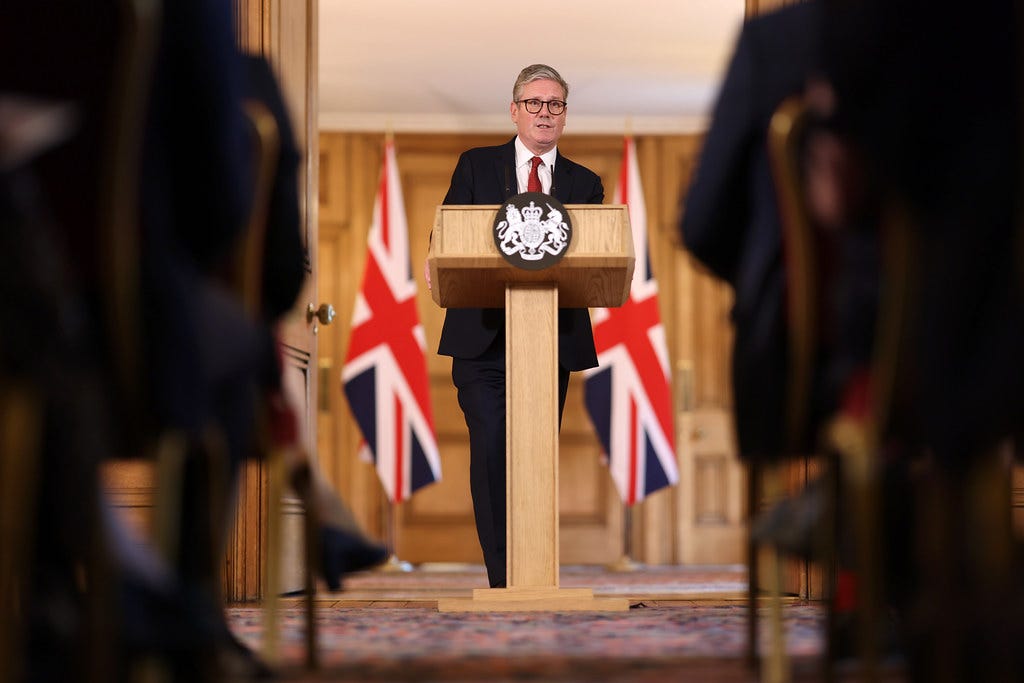
New Beginnings: Labour's First Month in Power
As we mark the first month of the Labour government under Prime Minister Keir Starmer, the nation finds itself in a period of both promise and challenge. With the spectre of protests and unrest shadowing its nascent administration, Labour is tasked with leading the UK through a complex political landscape inherited from its predecessors. Despite these difficulties, Fashion Roundtable stands firmly behind the Prime Minister, advocating for unity and diversity as the pathways to a brighter future.
The new Labour government inherited a challenging situation from the Conservatives, but this is not a time for despair. It is a time to rally behind a vision of hope and possibility, to transform difficulties into opportunities for progress. As a nation, we are stronger united, and it is through embracing our diversity that we can forge a path forward. Unity, not hate, is the answer to the trials we face.
The King's Speech: Charting a Course for Renewal
The King's Speech outlined a bold legislative agenda aimed at fostering economic growth, enhancing public services, and addressing climate change. With over 35 new bills, the government is set to tackle pressing issues ranging from housing shortages to NHS reforms. At its core, the agenda is about restoring stability and confidence in the UK’s future.
Key highlights include a renewed focus on clean energy, with plans to achieve clean power by 2030, supported by a National Wealth Fund designed to attract private investment into green projects. This fund aims to create thousands of jobs and drive sustainable economic development.
Additionally, Labour’s commitment to building 1.5 million new homes, alongside updates to the National Policy Planning Framework, promises to alleviate the housing crisis while fostering vibrant communities. These initiatives are crucial for creating an environment where industries like fashion can thrive, bolstered by stable economic conditions and a supportive infrastructure.
Rachel Reeves’ Budget Statement: A New Era of Fiscal Responsibility
Chancellor Rachel Reeves' budget statement was a testament to fiscal prudence and ambition. She laid bare the £22 billion overspend inherited from the previous government, emphasizing the necessity of transparency and accountability in public finances. By introducing measures such as the fiscal lock and regular spending reviews, Reeves aims to manage public funds with integrity and foresight.
This approach aligns well with the needs of the fashion industry, where transparency and sustainability are becoming increasingly vital. Reeves’ fiscal strategy, which includes tax incentives for eco-friendly practices, supports brands committed to ethical manufacturing and resource efficiency.
Moreover, by prioritizing investment in green technologies and sustainable practices, Labour is setting the stage for a resilient and innovative fashion sector. Reeves’ budget underscores the importance of aligning economic growth with environmental responsibility, providing a framework for fashion brands to thrive in a sustainable future.
Navigating the Storm: Unity in Diversity
The first month of Labour’s governance has not been without its trials. The nation faces protests and social unrest, a reflection of deep-seated issues that cannot be ignored. Yet, in these challenging times, it is crucial to remember that we are stronger united than divided. Fashion Roundtable echoes the Prime Minister’s call for unity, urging all to come together in support of a more inclusive and equitable society.
Labour's focus on inclusivity, as seen in its support for local manufacturing and fair labour practices, is a step in the right direction.. These policies not only support economic growth but also promote social justice, ensuring that every citizen has the opportunity to contribute to and benefit from a prosperous UK.
Looking Forward: A Vision of Hope and Progress
As we look ahead, there is much to be optimistic about. Labour’s commitment to sustainable development, economic stability, and social cohesion lays a solid foundation for the future. By embracing the challenges before us, we can transform them into opportunities for innovation and growth.
Fashion Roundtable is committed to supporting this vision, working alongside the government to ensure that the fashion industry not only recovers from recent challenges but thrives in a new era of creativity and sustainability. Together, we can build a future that reflects the best of our nation—diverse, united, and forward-looking.
In conclusion, the first month of Labour’s government signals a promising start. Despite the obstacles, there is a clear pathway to a brighter future. By championing unity, embracing diversity, and committing to sustainable growth, we can achieve a thriving and prosperous United Kingdom. Now is the time to act, to seize the opportunities before us, and to build a future that benefits all.
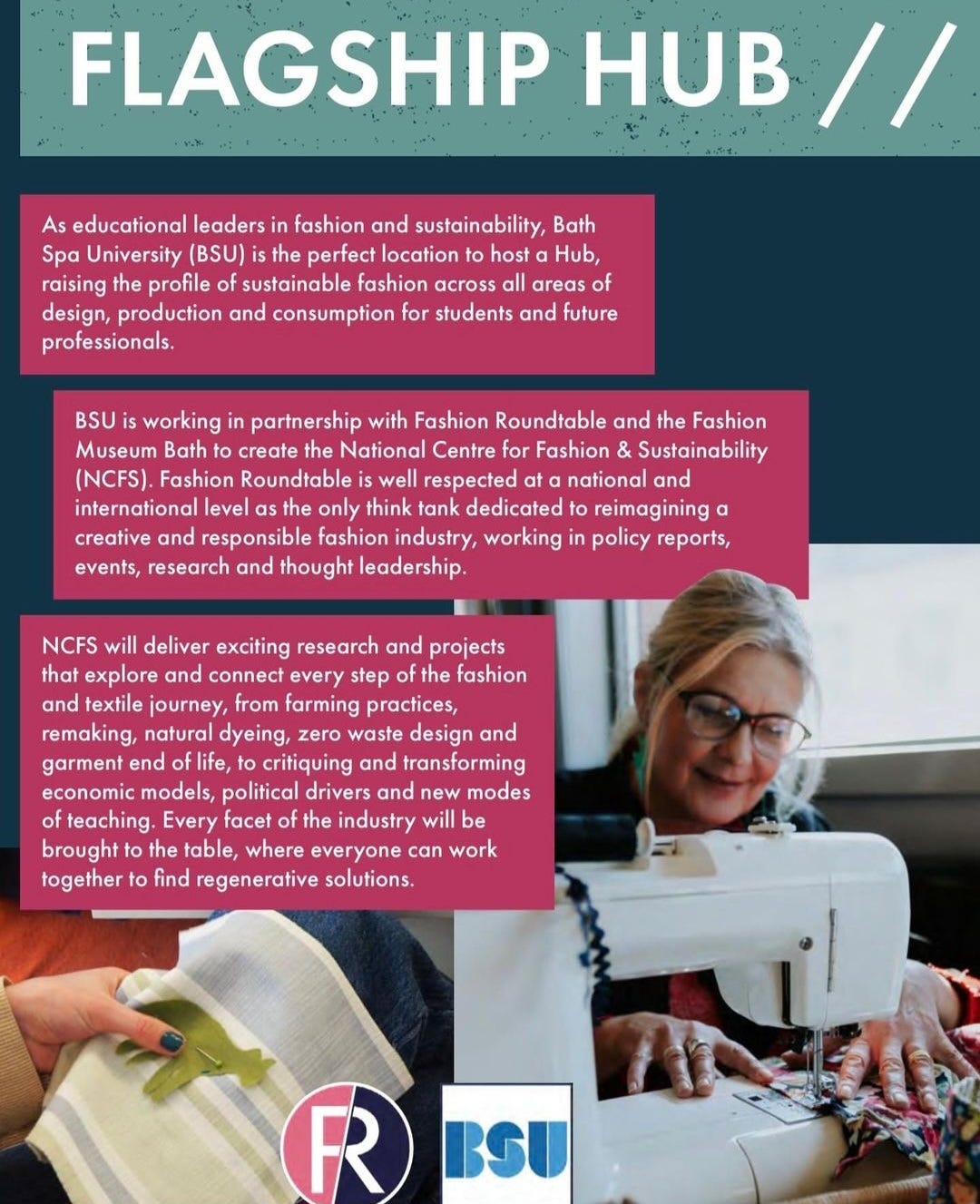
Event: Sustainable Fashion Week, 20th - 29th September 2024
Sustainable Fashion Week is back for it’s fourth year, celebrating the Power of Repair. Spreading out across the UK, SFW 2024 is an explosion of community action. Uniting the community in taking creative action, to change the fashion system from the bottom up.
The programme is split between their Hubs and their Fringe, with all activities being designed and delivered by brilliant and inspiring people in the community.
The Flagship Hubs partners this for this years SFW programme are Bath Spa University and the new National Centre for Fashion and Sustainability .
A partnership between Bath Spa University, Fashion Roundtable and the world-renowned Fashion Museum Bath, the National Centre for Fashion and Sustainability will create a space where leading thinkers, learners, businesses and communities can connect and drive the fashion and textile industry toward new, regenerative practices that will be healthy for people and the planet.
Event: Bath Fashion Festival, 21st - 22nd September 2024
A brand new festival this year, the Bath Fashion Festival will be coming to the Holburne Museum from 21st – 22nd September
Bath has a long connection to fashion. The Bath Fashion Festival explores this and the themes that go along with it.
MORE INFO TO BE RELEASED SOON
WE WANT TO HEAR FROM YOU!
We wanted to let you know that our newsletter will be taking a brief break for the next two weeks as we dive into an exciting period of planning and rejuvenation.
We'll be using this time to craft fresh, engaging content and revitalize our social media presence. Speaking of which, we’d love to hear from you on what kind of content you’re most interested in seeing from us. Drop us a message on Instagram, send us an email, or comment below.
We'll be back on the 20th August, full of new ideas and inspiration. Thank you for your continued support, and we’ll be back with you soon!
Lots of love,
The Fashion Roundtable team




